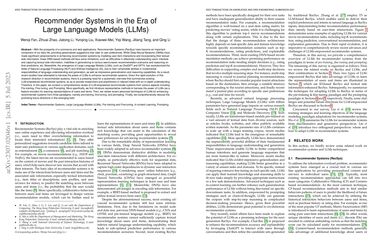Recommender Systems in the Era of Large Language Models (LLMs)
With the prosperity of e-commerce and web applications, Recommender Systems (RecSys) have become an important component of our daily life, providing personalized suggestions that cater to user preferences. While Deep Neural Networks (DNNs) have made significant advancements in enhancing recommender systems by modeling user-item interactions and incorporating textual side information, DNN-based methods still face limitations, such as difficulties in understanding users' interests and capturing textual side information, inabilities in generalizing to various recommendation scenarios and reasoning on their predictions, etc. Meanwhile, the emergence of Large Language Models (LLMs), such as ChatGPT and GPT4, has revolutionized the fields of Natural Language Processing (NLP) and Artificial Intelligence (AI), due to their remarkable abilities in fundamental responsibilities of language understanding and generation, as well as impressive generalization and reasoning capabilities. As a result, recent studies have attempted to harness the power of LLMs to enhance recommender systems. Given the rapid evolution of this research direction in recommender systems, there is a pressing need for a systematic overview that summarizes existing LLM-empowered recommender systems, to provide researchers in relevant fields with an in-depth understanding. Therefore, in this paper, we conduct a comprehensive review of LLM-empowered recommender systems from various aspects including Pre-training, Fine-tuning, and Prompting. More specifically, we first introduce representative methods to harness the power of LLMs (as a feature encoder) for learning representations of users and items. Then, we review recent techniques of LLMs for enhancing recommender systems from three paradigms, namely pre-training, fine-tuning, and prompting. Finally, we comprehensively discuss future directions in this emerging field.
PDF Abstract

 MIND
MIND